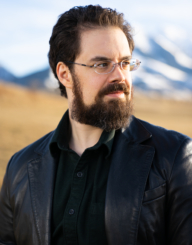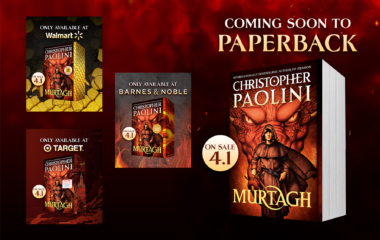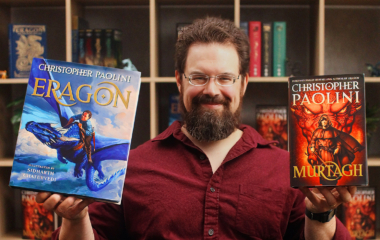Hey, everyone! As promised, here’s a sneak peek at Murtagh II (yes, I have a title, no I can’t share it yet) as a reward for helping The Book of Remembrance hit a million! Thank you so much! Fair warning, this is a raw first draft, and everything and anything is subject to change.
Christopher
p.s. This takes place directly after Tales From Alagaësia Vol. 2 (which has not been released yet).
p.p.s Fair warning there are (minor) spoilers in this excerpt.
p.p.p.s. To read this in a more book-like format, download the PDF here.
Sneak Peek At Murtagh II
Chapter 1
*******
Summons
Sneak Peek At Murtagh II
Humans had many annoying traits, but the most irritating of all was the way in which they built their stairs.
Kekvra snarled as he stubbed his big toe for the third time in a row on the stone steps, and he spat a fearsome curse.
At least when walking outside, the shape of the ground changed from stride to stride. It went up, it went down, it was flat, it was steep, it was soft or hummocky or sharp-edged and strewn with loose rocks. There was grass to pad your feet or mud to slow them or, in the winter, snow drifts that dragged at your legs. As one walked, some strides might be short and some might be long, but overall, one could move in a way that was comfortable.
But here none of that held true. The human stairs were built to fit the stumpy legs of the soft-skinned Hornless; the steps were both too short and too shallow for an Urgralgra of his stature, and they forced Kekvra to move at an awkward gait that left him feeling as if he were a hobbled goat. Dwarven stairs—like the ones he remembered from under Farthen Dûr—had even shorter steps, but they were not so steep as a result, and he could climb them with a more comfortable stride.
Unfortunately, all of the stairs in the Academy at Mount Arngor had been made to fit humans. Or elves. Kekvra had never seen elven-built staircases. He did not even know if they used stairs. Maybe they just climbed their trees as a squirrel might, or they used ladders, or they flew around like pretty little birds using their magic, or—
A sharp pain jolted through his right big toe.
He grunted and then stopped and stood where he was, clenching and unclenching his fists until the pain dwindled into a dull throb. He would almost rather be stabbed again than to keep hitting his toes. Almost, but not quite.
He eyed the carved columns that lined the broad staircase. He wanted to hit them, to spend his fury on the Dwarven ornaments, to break and smash them to tiny pieces. But if he did, he would have to stand in judgement before Skarghaz, their war-chief at the Academy. Skarghaz would understand, but it would cause unnecessary trouble for their little band, and Kekvra did not want to be the cause of such trouble.
“Rahna forgive me,” he said, and his shoulders relaxed as he felt the comforting presence of the goddess upon him.
Then he continued climbing.
It was a long way from the dragon hold below to the quarters atop the White Tower beside the hold. Without a dragon to ride, Kekvra could not think how or why anyone would want to live so high up. Just fetching food and water would take an unreasonable amount of time and effort; moreso than was practical for anyone, even an elf.
He kept climbing. The stairs were wide enough for a dragon, but he doubted that Saphira or any of the hatchlings would bother to use them, not so long as their wings worked.
It was late, and the windows cut into the outer wall of the tower showed nothing but the dark of night, and the only light came from the dwarves’ weirding lanterns hung between the columns. Outside, the wind blew in fitful gusts; inside, the sound of his boots scuffing the cut stone echoed softly along the curved staircase.
Kekvra stopped in front of the wooden door just off the stairs—which continued upward past his sight to the eyrie at the very top of the tower. His breath was short, and he was hot and sweaty despite the winter chill, and overall, he felt thoroughly uncomfortable and out of sorts. He growled and pounded his fist against the door.
There was no answer, so he pounded again, harder this time.
From inside came a muffled voice: “Go away!”
Kekvra’s upper lip curled. He struck the door a third time.
“Go away!”
“Drajl,” cursed Kekvra. Then he raised his fist and brought it down so hard that the surface of the wood splintered. “Open!” he bellowed. And he kept pounding the door with a regular thud, thud, thud, same as if he were pounding a drum at a summer festival.
It wasn’t long before the door was yanked open from the inside and Kekvra found himself looking down at a furious-looking human. But not just any human, the dark-eyed, red-bladed kingkiller himself: Murtagh.
The human wore an elven robe, and he held a quill bloody with ink in his right hand. Behind him, Kekvra spotted the crimson sparkle of the dragon Thorn’s scales—the dragon curled upon the floor, wings stored in neat folds upon his back, like leather and poles tied up for travel.
“Are you deaf, Urgal?” said Murtagh. “I said go away. Nothing is so important that you need disturb me at this hour.”
Kekvra lowered his horns and showed his teeth as his blood grew hot with anger. He wanted to butt heads with the human, knock him to the ground and teach him respect. If he had been an Urgraglra, he would have, but the Hornless had different ways—wrong ways—and despite the human’s seeming punyness, Kekvra knew him to be a mighty warrior. That much, at least, he admired.
Nevertheless, despite his anger, Kekvra knew his duty, and he held to it. “I bring word, human. A bird has arrived carrying a message for you from Uvek Windtalker.”
Murtagh’s face sharpened. In the background, Thorn stirred. A great, glittering head moved into sight, and the dragon’s enormous red eye fixed itself on Kekvra with unsettling intensity.
Kekvra was proud to show no fear.
“I see. And what says Uvek Windtalker?”
“He asks for your help, Rider. He asks as your qazhqargla, as your blood brother.”
~~~~~~~~~~~~~~~~~❖~~~~~~~~~~~~~~~~~
A cold stab of … not fear but something akin to it went through Murtagh, and he felt his heart skip a beat. Anticipation of something momentous, that was it. He felt himself standing upon the edge of a cliff, teetering as if to fall.
What could Uvek need of him? Concern for the Urgal battled within Murtagh along with equal concern for what Uvek might ask of him, and all of it bound up with dark memories of their time in Nal Gorgoth.
Thorn joined his mind more closely, and Murtagh took comfort in his presence.
Murtagh kept his voice low and steady despite his inner turmoil. “Did Uvek say why he needs my help?”
The Urgal showed more of his teeth. “He did not, Rider. Does it matter? You are his blood brother. That he asks should be enough.”
Murtagh matched the Urgal’s gaze. Kekvra, he thought, although he sometimes had difficulty telling members of his kind apart. “And it is. When and where does he wish me to go?”
The Urgal raised his chin. “He wishes you to meet him in the north and as fast as possible. Skarghaz has set me to be your guide.”
“Very well. Let it not be said that I do not honor my oaths. Kekvra, is it? Come and wait by the fire. There are things I must attend to ere we depart.”
Murtagh stood aside, and the Urgal brushed past him. A pungent sweat-musk, strong enough to make Murtagh take a half- step back, came from the ram.
As the Urgal settled by the fire, Murtagh said to Thorn, You are not bound to Uvek as I am.
No, but I owe him as much, and I am not about to let you go off by yourself. Besides, how else would you reach him in a timely manner but with me?
A hint of a smile touched Murtagh’s lips. “How else indeed?” he murmured. Then he returned to his desk and cast a rueful eye over the lines of runes he had been penning upon a scrap of parchment. Words. So many words. All of them in the ancient language, and all of them new or unfamiliar to him.
His gaze drifted across the piles of scrolls and books that covered the rest of his desk. Never in his life had he pursued the scholarly arts so assiduously; never had he wanted to. He felt as if he was working his mind as hard as he worked his body on the training field. It was a new and somewhat strange sensation, but he welcomed the experience, for the strain told him that he was learning and growing, again much as he might improve on the training field. And he wanted to improve, for he was determined to avoid the mistakes of the past and to ensure that no one ever outmatched him in mind or body.
Still, it was odd to spend the bulk of his time reading and writing, save for when he was teaching the new Riders or learning from Eragon. And that was its own special form of discomfort.
Thorn stirred and blew a small flame from his nostrils. Do you think Uvek has found more of the Draumar?
All thoughts of peaceful pursuits left Murtagh’s mind. I hope so. Then he met Thorn’s gaze. And I don’t.
From the fire, Kekvra watched as Murtagh went to his sleeping area and opened the plain wood wardrobe that stood next to his bed (which, likewise, sat next to Thorn’s own padded nest). He removed his robe and donned his day clothes before taking out his sword, Ithring, and belting it on. Then too, he took out the Dauthdaert, Níernen, and carried the spear to the Urgal.
Kekvra tensed, as if expecting an attack. His yellow eyes widened as Murtagh held out Níernen and said, “Keep this for me while I am gone. I will be back soon.”
The Urgal grunted and then took the spear and rapped the butt of it on the stone floor. “I will be here, Rider.”
“Good.” Murtagh cast a knowing glance at Thorn, and the dragon twitched his tail with amusement. If we must travel together, I would bind him to me in large and small ways.
I know your intent, said Thorn.
Then Murtagh departed their quarters and, with quick steps, climbed the stairs that led to the eyrie above.
Halfway there, he beheld a small, hooded figure descending toward him. He stopped, and the figure stopped as well. They stood there, facing one another, wary and unmoving, the night silence pregnant with anticipation.
Then the person pushed back their hood, and in the dim lantern-light, he saw as he expected: the witch-child Elva.
She cocked her head, her violet eyes burning with an unnatural force.
“Don’t,” he said, and put his hand on Ithring’s pommel. “Don’t you dare. I have no interest in what you might say to me.”
She blinked, then looked at the stars out the nearby window. “It has been a cold winter this year.”
“Aye. That is known to happen. Move aside.”
Her violet eyes returned to him. “It will grow colder still, Murtagh son of Morzan. The rivers will freeze, and the beasts of the field will die in their drifts, and the birds will drop from the sky. Seek you where there is warmth. We all must.”
Then she drew her hood back over her head and continued past him with soft footsteps that soon faded into silence.
He did not relax until all sign of her was gone.
With a curse, Murtagh released Ithring and continued on his way. One of the reasons he studied the ancient language so intently was to avoid the sort of mistake Eragon had made when he attempted to bless the baby Elva. What she had become was unlike anyone or anything else in Alagaësia, and though Murtagh wished her no ill, he had no desire to be around her. It was too easy for her to destroy a person, and Murtagh would not let himself be destroyed.
Even so, he made a note to bring extra furs on their journey.
Soon enough he arrived at the entrance to the eyrie. He knocked, and after a few moments, the door swung open to reveal Eragon standing before him.
His half-brother wore an evening robe much like Murtagh’s, but he showed no sign of sleepiness. Another gift, Murtagh supposed, of his transformation among the elves. Tired or not, he still looked wan and haggard from his recent ordeal—the skin about his eyes was unnaturally thin, and blue veins showed beneath—and Murtagh feared that his wound was not yet fully healed.
Eragon raised a questioning eyebrow.
“We need to talk,” said Murtagh.
Sneak Peek At Murtagh II



